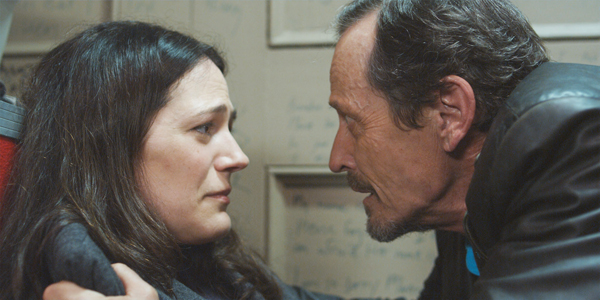|
Reviews of Recent Independent, Foreign, & Documentary Films in Theaters and DVD/Home Video

PONTYPOOL Zombie films, ripe for humor, extravagant effects, and apocalyptic social messages, have thrived in the postmodern era, bringing contemporary audiences everything from Zack Snyder’s bare-knuckle remake of Dawn of the Dead to the bone-dry chuckles of Shaun of the Dead. Yet, from its opening riff on Norman Mailer to its final scene (which arrives after the closing credits), Pontypool stakes its claim as one of the most eccentric entries in a genre that’s not exactly known for its conventionality. Directed by celebrated Canadian director Bruce McDonald—whose last cinematic experiment, The Tracey Fragments, failed to squeeze out any stateside box office dollars even with a post-Juno Ellen Page—and adapted by Tony Burgess from his novel, Pontypool Changes Everything, Pontypool is adeptly crafted and likely to send a few shivers down the spines of art-house audiences. Whether it will make any sense in hindsight is an entirely different matter. In the small Canadian town of Pontypool, recently demoted shock jock Grant Mazzy (played with aplomb by veteran Stephen McHattie) drinks and grumbles his way through a morning broadcast while his straight-laced producer Sydney (Lisa Houle) prods him to read the school’s snow day closings instead of launching into another rant. All the while, young technician Laurel (Georgina Reilly) walks the line between enabling Grant’s endearingly prickly behavior and sustaining Sydney’s perfectly reasonable law and order. As disturbing news trickles in from the outside world, Pontypool begins its transition into the zombie genre. Though little evidence of the accelerating disaster zone outside the studio’s door makes it onscreen (McDonald carefully allocated his meager budget), the tension builds potently. McDonald’s tight pacing, along with Miroslaw Baszak’s disciplined camera, prevents Pontypool from looking like a filmed radio play (which it was in yet another incarnation). McHattie’s performance is gripping; head arched up towards the microphone, he whips his voice into a gravely singsong and looks to be using heretofore undefined facial muscles to convey nuances so slight that they warrant the film’s proclivity for close-ups. McHattie, donning a cowboy hat, may not have flown in Bergman’s wintry world, but he’s mighty fine in McDonald’s chilly Canada, and Lisa Houle (McHattie’s real-life wife) is nearly perfect as his foil. Shot, like Steven Soderbergh’s recent films, on the RED Camera, Pontypool looks crisp and naturalistically moody, neither staged nor sloppy; the cinematography compliments McDonald’s choice to stay relatively conservative with the tone and play down the absurd moments that could have been milked for awkward laughs in lesser hands. But,
ultimately, it’s hard to call Pontypool a home run, or even a
triple. As it progresses, and the explanations behind its narrative are
teased out and examined, the film loses credibility, seeming more like a
half-baked attempt to start an existential conversation amongst stoners
majoring in linguistics than a fully realized story. (Let’s just say
that the zombie virus spreads in a particularly unusual fashion.) Once
political issues—everything from French-Canadian separatists to the war
in Afghanistan—are carelessly incorporated, the seeds of a romance are
planted, and blood begins to spill, the plot holes become impossible to
ignore. Pontypool is content to leave questions unanswered, but
in this arena of zombies and horror, that turns proves to be more
exasperating than refreshing. Patrick
Wood
|

